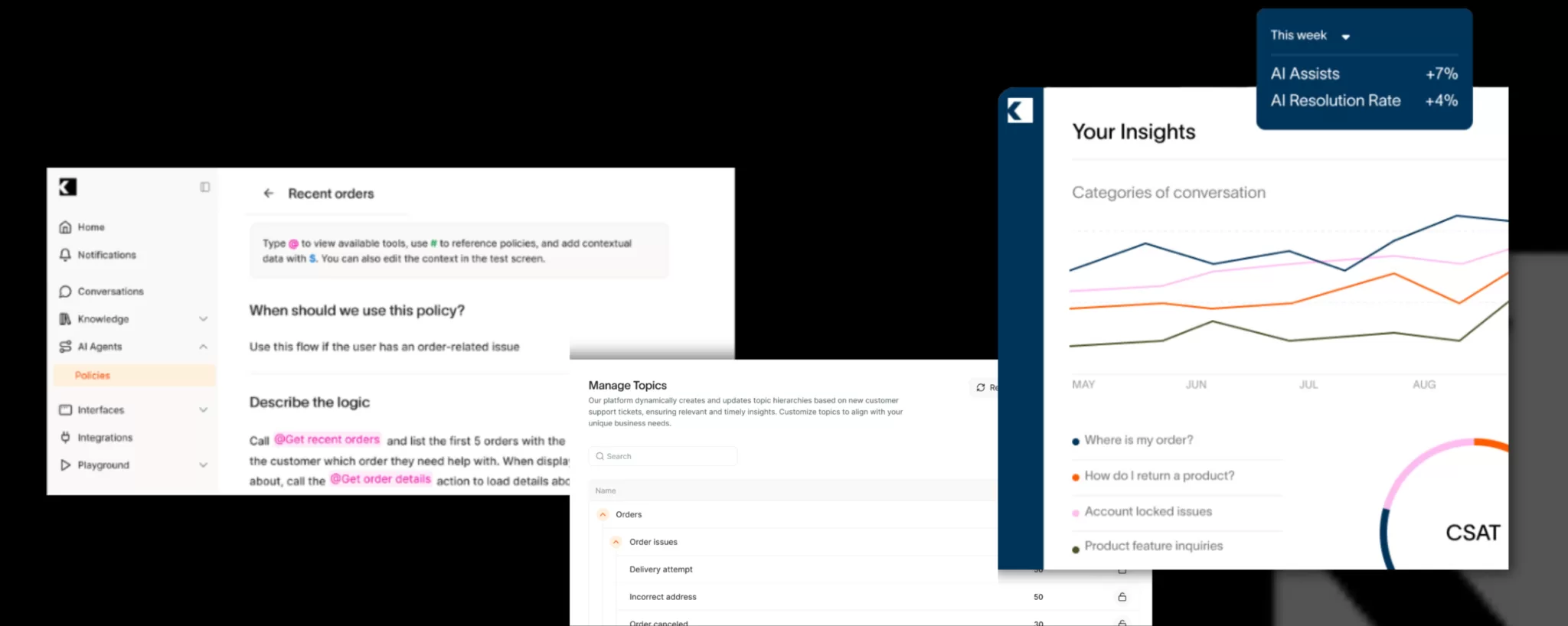For CX leaders, navigating the potential options for CX optimization with AI can be a daunting task. The time and money invested in gen AI tools for customer support needs to show fast ROI and choosing incorrectly could lead to more frustrated employees and customers. So how do we differentiate solutions for CX optimization with AI? With the market expanding rapidly, new solutions are popping up daily. Some just a thin veneer on top of a public AI model and others a robust, customizable solution using combinations of many models to drive your success. A purchaser needs to be prepared and ask the right questions to distinguish the right vendors to help improve support agent performance with AI.
Identify your Use Cases
AI tools for support agents solve a variety of problems.

It is important to remember the question isn’t “what AI can do for us?” it is “what problems are we trying to solve and can AI help us?” You have to always start with the problems that are causing churn, lower productivity, agent or customer frustration, strategy problems, etc.
In the market, you can expect to see terms like:
• Workflow Automation
• Conversational AI
• Ticket Categorization
• Sentiment Analysis
• Action Recommendations
• Intelligent Support Operations
• Automate quality assessments or compliance
These types of tools can have distinct and overlapping features, but almost always come with the marketing promise of “Supercharge support agents with AI,” “Optimize your Operations,” “Increase productivity,” “Reduce manual effort,” and many more.

As a purchaser, we need to step above the terminology and ask ourselves: What is/are the problems we have now and what will they be as we scale and evolve?
Asking this question will make all the difference in your ability to differentiate AI solutions for CX.
Find AI solutions for CX
CX optimization with AI can take many forms. Each of these questions may change the product(s) you are looking for. This list is not exhaustive, but is a great start on how to identify the impacting problems that Gen AI tools for customer support can help solve:
Q1. Are your ticket workflows complex, require data from many apps, or weeks of training?
A1. Then Workflow automation is a good solution. Workflow automation improves support agent performance with AI.
Q2. Do your customers feel your responses aren’t fast enough or require you to answer questions 24/7?
A2. Conversational AI can help here.
Q3. Do you have the right insights to improve processes and products based on customer feedback and ticket data?
A3. Intelligent Support Operations can give you insights on what to improve.
Q4. Is ticket routing or reporting on categories hindering your ability to make intelligent staffing decisions and delaying responses?
A4. Ensure your tickets are categorized well and fed into a workforce management tool.
Q5. Is the problem customer access to knowledge or agent access?
A5. This could be an action recommendation problem, conversational AI, or workflow automation issue.
Q6. Do you need your customers to self-serve?
A6. Customer-facing workflow automation or conversational AI will give you great results.
Q7. What demographics are you trying to serve and through what channels will they access support?
A7. Phone AI systems differ greatly from chat and email ones, and you should choose the ones your customers prefer.
When sourcing AI tools, you require a clear idea of what your needs are. Some tools will do some, all or parts of each of these categories. The answers to these questions will help you differentiate the potential vendor solutions and find the one that will best supercharge support agents with AI.
Ask the Difficult Questions
Once you have an idea of the solutions you want to focus on, there are some key differentiators that may impact your decision. You need to dig deeper into the solution and the company direction before making a final decision.
To assist, here are some questions to ask and some guidelines on what you should be looking for.
Q1. What AI model(s) do you use?
A1. All models are not equal. Depending on your need, using a publicly available model like ChatGPT might work, and in others a proprietary model might be more useful.
Q2. How is the tool trained?
A2. What data is required and how “clean” does it need to be? This may impact the manual preparation time.
Q3. What manual effort will it take to train the model or build actions based on its training?
A3. Do not accept “it works out of the box” as an answer. CX optimization with AI requires some level of training, manual or otherwise to know your data.
Q4. Is any of our company data sent to a publically available model or to any third parties?
A4. AI tools for support agents do have inherent security concerns. Some tools may require data to be sent to a generic LLM model and that data could then be ingested by the model. Depending on your use cases, that may not be acceptable.
Q5. How do we tweak any errors/hallucinations in the model or its responses?
A5. All GenAI tools for customer support will need to have a way to make sure that responses are always as accurate and useful as possible. If mistakes are found, how are they corrected?
Q6. What tools do you integrate with and do they need specific license requirements?
A6. It’s important tools work within your tech stack, and that if it requires a certain tier of license you are willing to spend the added cost to purchase that level.
Q7. What is the cost model?
A7. Pricing for AI tools can be complicated. Platform fees, user fees, usage fees, per resolution costs (What is defined as a resolution?).
Q8. What are the capabilities versus features?
A8. Gen AI tools for customer support are expanding rapidly. The models may have been built with a lot of capability, but the actual implemented features aren’t there yet. Make sure to distinguish those either during a demo or in a pilot/proof of concept phase. Just because a model has the capability to solve many use cases, does not mean it has been implemented and tested to do so. Making this distinction clear will help you avoid “snake oil” or solutions that try to be everything to everyone and don’t do anything well.
Differentiating AI solutions for CX
AI Solutions for CX are going to be an important trend in the next few years. It is vital that your strategy start to include details on where these tools can improve your services. However, with so much hype, marketing lingo, and with how “magical” Gen AI tools seem, it is easy to get caught up in the beauty rather than the function. Differentiating solutions is a necessary step in procuring the right tools for you and ones that are actually able to supercharge support agents with AI.



